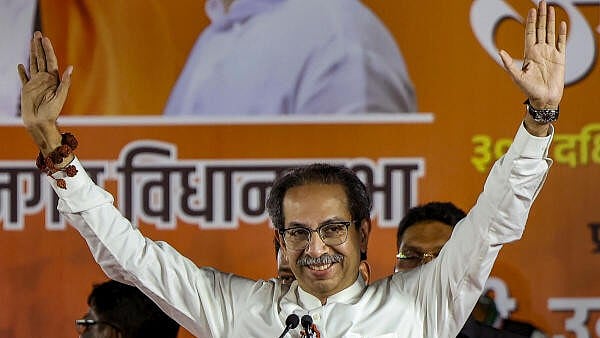
Shiv Sena (UBT) chief Uddhav Thackeray.
Credit: PTI Photo
Mumbai’s Muslims are working for Uddhav Thackeray’s Shiv Sena with an enthusiasm not seen within the community since the 2014 Lok Sabha polls, when they were swept off their feet by Aam Aadmi Party (AAP) leader Arvind Kejriwal. At that time, a panicky Congress, aware of the discontentment the Muslims felt towards it, presented the spectre of Gujarat 2002 to frighten the Muslims into not dividing their vote. The ploy worked; yet, the Muslim youth, exhilarated by a party that saw them not as a vote bank but as no different from other citizens, threw themselves into the campaigns of the 48 AAP candidates in Maharashtra. Dil mein AAP, dimaag mein Congress (AAP in our hearts, Congress in our brains), was a common refrain then.
In the 2019 Lok Sabha polls, the Congress-Nationalist Congress Party (NCP) alliance got Maharashtra’s Muslim vote by default, even though it was neither in the dil nor dimaag of Muslims. By then, lynchings and the felicitation of lynch mobs by the ruling party had become frequent. There was no option but to vote for whichever party stood against the Bharatiya Janata Party (BJP), even if its presence on the ground seemed non-existent, like the Congress in Maharashtra. The party won one seat in the state it had ruled for an unbroken 15 years.
This time, however, the I.N.D.I.A. bloc has become the natural choice not just for the Muslims, but for all those opposed to the BJP. The slogan now is: ‘Candidate toh majboori hai, India Alliance zaruri hai.’ (The candidate is a compulsion; the I.N.D.I.A. alliance is a necessity). The lack of even a single Muslim I.N.D.I.A. bloc candidate is galling; after all, parties such as the Congress-NCP depend on the Muslim vote. Equally hurtful is the way alliance candidates refrain from mentioning the community in their speeches, despite the BJP, including the Prime Minister, targeting the Muslims in their campaigns. (A refreshing exception was Congress President Mallikarjun Kharge’s reply to Modi’s description of the Muslims as those who have more children).
But the Muslims have decided to ignore such slights. Such is their determination to vote for the I.N.D.I.A. bloc that in Mumbai, some All India Majilis-e-Ittehadul Musileem (AIMIM) office-bearers and workers resigned after facing public anger over the party’s decision to put up a candidate in the city. In conformity with AIMIM strategy, it chose a constituency with a Congress candidate. (The AIMIM’s sitting MP Imtiaz Jaleel from Aurangabad might prove an exception and get the bulk of his community’s vote.)
However, while the Muslims do feel let down by the ‘secular’ parties they’ve always supported, there’s no such disappointment where Uddhav Thackeray is concerned, though, as Bal Thackeray’s son, he carries far heavier baggage than the Congress. But that’s all in the past. Hardly anybody remembers the 1984 Bhiwandi-Thane-Mumbai riots. As for the 1992-1993 riots which ravaged Mumbai after the Babri masjid demolition, leaving 900 persons dead, 575 of them Muslim (Srikrishna Commission Report, Vol I, Chapter II, Para 1.24), a new generation has grown up since. Mumbai itself has changed post-liberalisation, and the Muslims, especially the post-riots generation, are a visible part of this new city.
But it’s not just a story of forgotten wounds. Even before he broke away from the BJP, Uddhav Thackeray’s barbs against his partner were drawing attention. After the 2019 split, Uddhav Thackeray became the BJP’s fiercest critic. Unlike the Congress, he didn’t have to hold himself back for fear of alienating the Hindus, neither in speech, nor in action. Only a party confident of its Hindu credentials could counter the BJP’s insistence on reopening temples during the Covid-19 lockdown with the retort: “today, health temples through hospitals are more important.”
As chief minister, Uddhav Thackeray’s firm handling of potentially explosive communal situations: be it the 2020 Palghar lynching of two sadhus; an attempt by a media channel to communalise a protest by migrant labour during the lockdown; or MNS chief Raj Thackeray’s threat of reciting Hanuman Chalisa if the relaying of azaan on loudspeakers was not stopped — came as a refreshing surprise for Mumbaikars. In all their years in power, the Congress-NCP had never shown such firmness against elements bent upon stoking communal trouble.
All of this has convinced the Muslims that Uddhav Thackeray, notwithstanding his claims of not having abandoned his father’s ideology, is more influenced by the ideology of his grandfather Prabodhankar Thackeray, a known social reformer.
While there is yet no proof of this, the Muslims are determined not to let anything mar their enthusiasm for Uddhav Thackeray. As the community takes the initiative to hold meetings for Shiv Sena (UBT) candidates, mention of the B N Srikrishna Commission report that indicted Bal Thackeray for the 1992-1993 riots is forbidden.
This new equation that’s emerged over the last five years gives rise to one question: in the absence of genuine secular politics, can only a party unapologetic about its Hindu identity counter Hindutva?
(Jyoti Punwani is a senior journalist.)
Disclaimer: The views expressed above are the author's own. They do not necessarily reflect the views of DH.